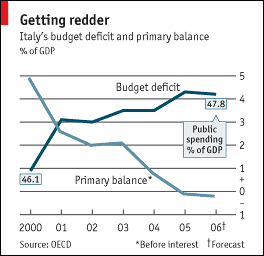 The Economist has an article this week on the latest budget proposals, and they are not exactly amused by what Tommaso Padoa-Schioppa has been up to (thanks Roberto for the link).
The Economist has an article this week on the latest budget proposals, and they are not exactly amused by what Tommaso Padoa-Schioppa has been up to (thanks Roberto for the link).Basically the Economist are crying foul (the article is sub-titled Another year. Another Italian budget. Another ruse). The object of their ire is a provision in the proposal to transfer half the money collected by employers on behalf of their workers (for things like severance pay, and wages in the event of bankruptcy) and not handed to pension funds to the government for safe keeping.
The draft 2007 budget unveiled by Mr Prodi's finance minister, Tommaso Padoa-Schioppa, includes a provision to transfer half the cash not handed to pension funds to the government. This may be defensible, since it trims a hidden subsidy to Italian business (in the form of cheap financing). What is inexcusable is that the budget treats the cash as revenue, not as a debt that will have to be repaid. The forecast inflow, €5.3 billion ($6.7 billion), makes up over a third of the amount that the government claims to be cutting from the deficit.
In particular the Economist is angry with Padoa-Schioppa:
This is not the sort of thing you expect of a former board member of the European Central Bank. But it shows how far Mr Padoa-Schioppa has had to bend to placate demands by left-wing parties within the government.
Well quite. But the issue is rather more important than the personal credibility of one ex Central Bank Director. As the Economist points out the sum involved is around one third of what the government claims to be cutting. So this is not small beer. So the issue really is just how serious is the Italian government in getting to grips with the structural deficit problem. I have reproduced the graph from the Economist article at the start of this post (a graph which, as Claus Vistesen comments, says it all).
The Italian government has a long term structural deficit and this will not be resolved by one-off measures like the one mentioned above, even were these licit ones. As it is the proposal is far from licit, in the sense that the money transferred constitutes a future liability. Naturally I imagine Padoa-Schioppa can use the 'pyramid-sales' type argument that this debt will never be repaid as one generation of workers replaces another, but recourse to this kind of argument would seems to reveal just how much they are missing the whole point of the situation, since in the future each new generation will not replace the previous one.
The Economist speculates on whether or not the EU Commission will buy the proposal, but I would frankly be much more concerned about the rating agencies who may well downgrade Italian debt if the deficit is not within the agreed limits next year, and on the reaction over at the ECB to any ongoing downgrade process.
And even aside from the 'ruse' issue, there are reasons to worry about whether the budget will deliver all that it claims it will deliver. In the first place there is the little question of the 7 billion euros of extra revenue which are anticipated from curbing tax evasion.
There are in fact reasons to doubt the viability of this number precisely because of the other (third) leg of the budget: the tax increase from an overall 41% to an overall 43% rate for those earning €75,000 a year or more. Now obviously an increase like this is likely to increase rather than reduce the temptation for evasion (you know, you go to the dentist and they ask you, would you like the work with or without a bill).
The change in the tax structure is really based on the old Keynesian idea of Marginal Propensity to Consume (that is the idea that the poor spend a higher proportion of their income than the rich) and this thought seems to lie behind Hans's recent commment that "redesigned tax rates will put more money in the pockets of the little woman", and this may be, but let us not forget there is another version of the MPC issue and it is *age related*: people in the 50 to 65 age group have a greater tendancy to save a higher proportion of their income (or spend a lower portion) than those in the 35 to 50 age group, and in each and every one of the years to come Italy will have more people in the former group and less in the latter one, so there is an inbuilt structural tendancy to reduce consumption each year as we move forward. This is what an ageing population means.
Also, and finally, all the budget calculations are based on a growth estimate for next year which may turn out to be considerably over-optimistic in the context of the way the global and eurozone economy is currently moving. So my advice is to watch all this very carefully as 2007 progresses. Someone, somewhere is in for a stormy ride.












